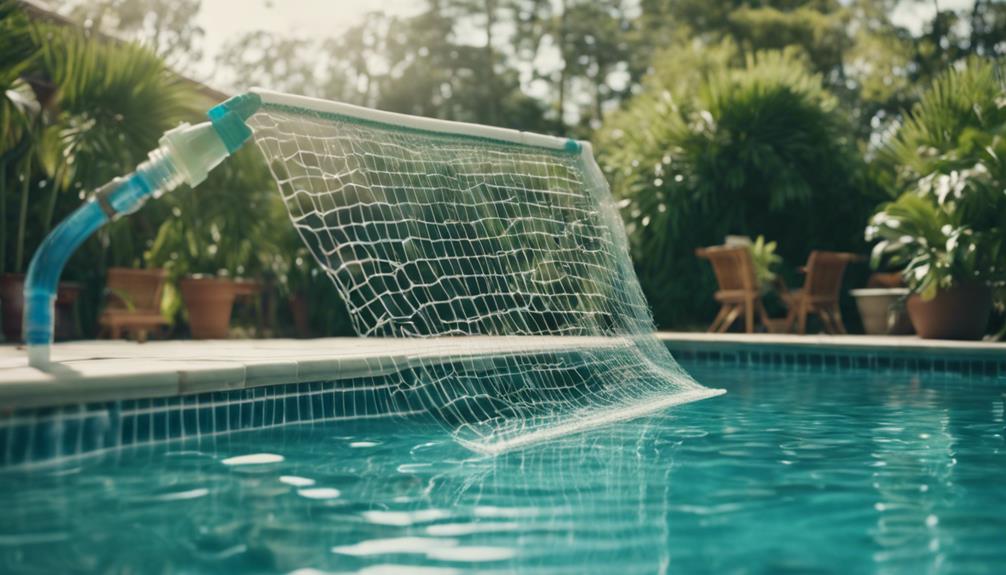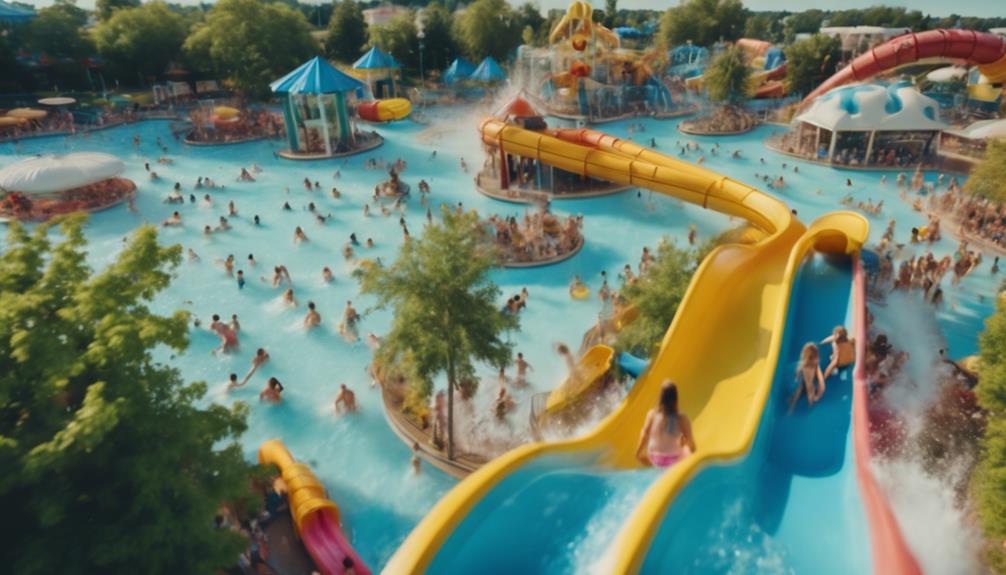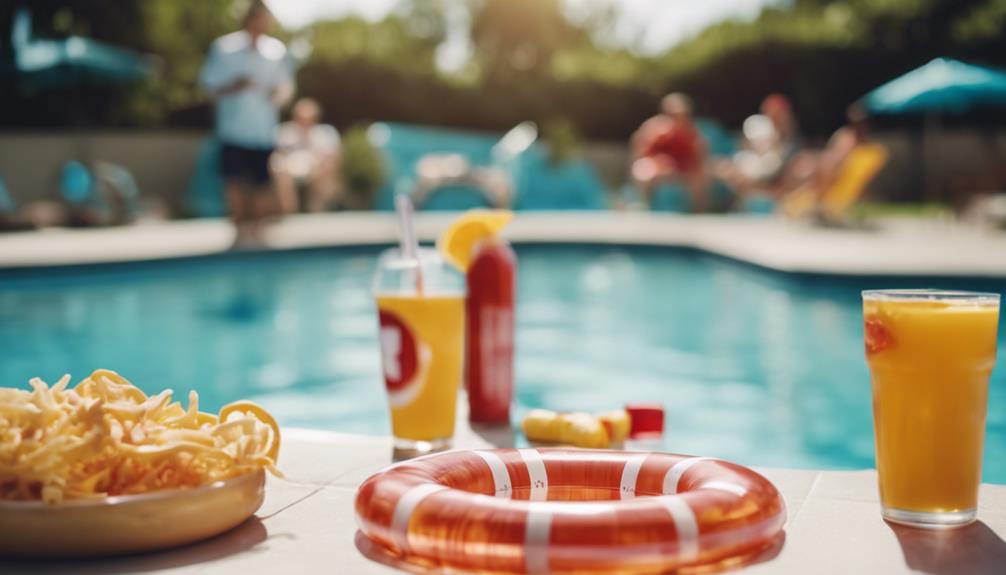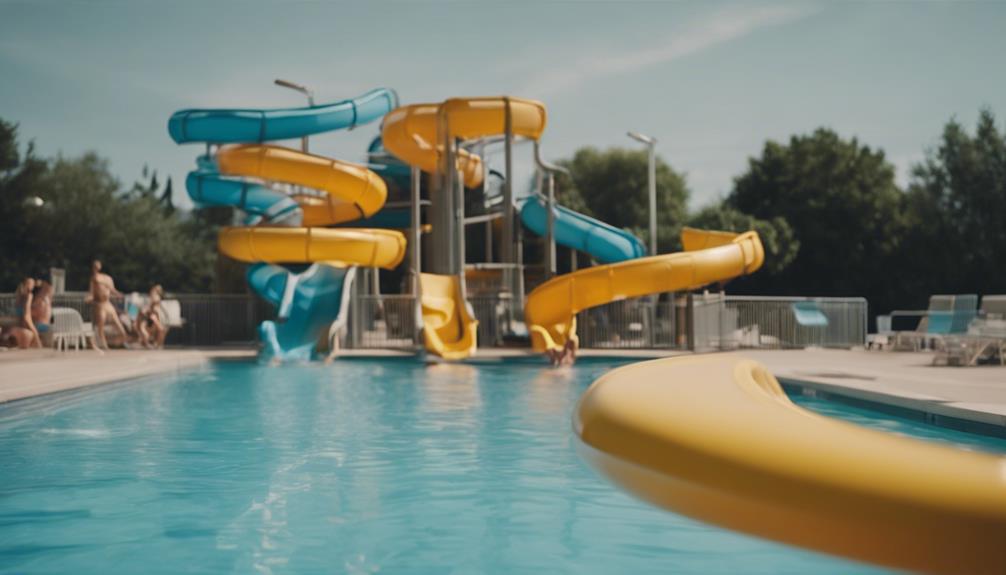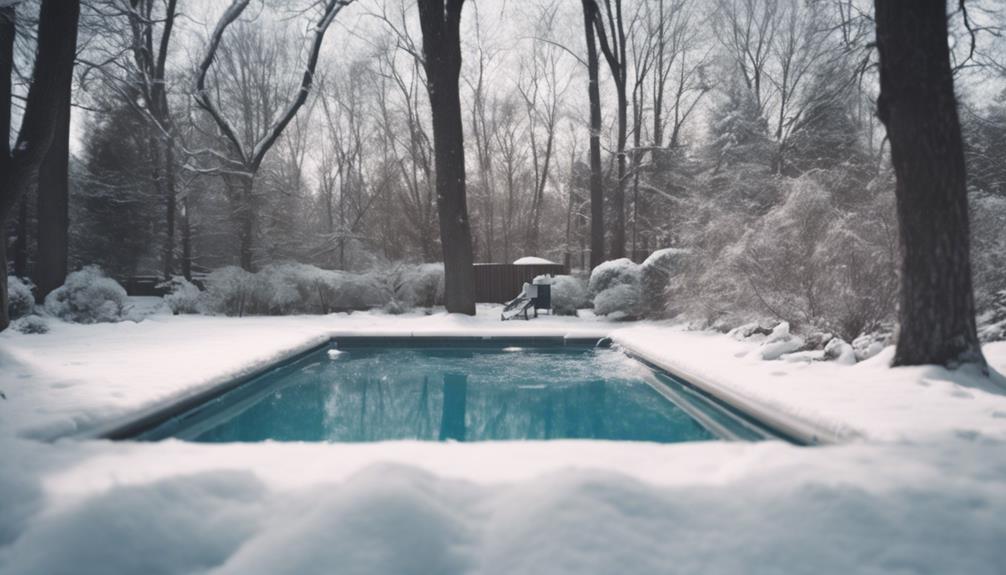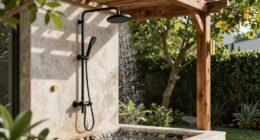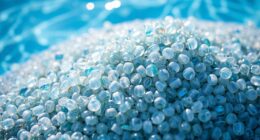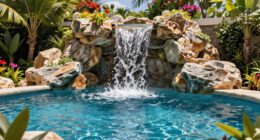To keep your pool primed this summer, focus on maintaining appropriate water levels, testing pH regularly, monitoring chlorine levels, performing pool shocking, vacuuming, brushing, maintaining proper circulation, and adhering to essential cleaning routines. Proper water levels support equipment efficiency, while pH and chlorine levels impact water safety. Pool shocking removes impurities, while vacuuming and brushing eliminate debris and algae. Effective circulation prevents algae growth. Finally, prioritize balancing chemical levels and consult professionals for expert advice on pool maintenance. Mastering these practices guarantees a safe and enjoyable swimming experience all summer long.
Key Takeaways
- Maintain proper water level for filtration and equipment health.
- Monitor pH and chlorine levels for a safe swimming environment.
- Perform regular pool shocking to remove impurities and maintain clarity.
- Vacuum and brush pool weekly to eliminate debris and algae.
- Ensure proper circulation by running the pump daily and cleaning filters.
Pool Water Level Maintenance
Maintaining the suitable water level in your pool is crucial for guaranteeing the best filtration and preventing equipment damage.
A mid-skimmer water level is ideal, as low levels can harm the pump, while excessive levels can disturb the chemical balance.
Regularly checking and adjusting the water level will help prevent equipment issues and ensure peak pool performance.
By monitoring and maintaining the water level, you can enhance the effectiveness of your pool's filtration system and prevent costly equipment repairs.
Ph Level Testing
Regularly testing the pH level of your pool water is vital for maintaining a safe and enjoyable swimming environment. The pH level indicates how acidic or basic the water is, affecting both the pool equipment and the swimmers.
Ideally, pool water pH should be between 7.2 and 7.8. A low pH can lead to skin and eye irritation, while a high pH can cause scaling and cloudy water. Monitoring the pH level using a test kit is important to ensure proper balance.
Adjusting the pH as needed will not only protect swimmers from discomfort but also help maintain the effectiveness of other pool chemicals. Prioritize pH level testing to uphold a healthy and invigorating pool environment.
Chlorine Level Measurement
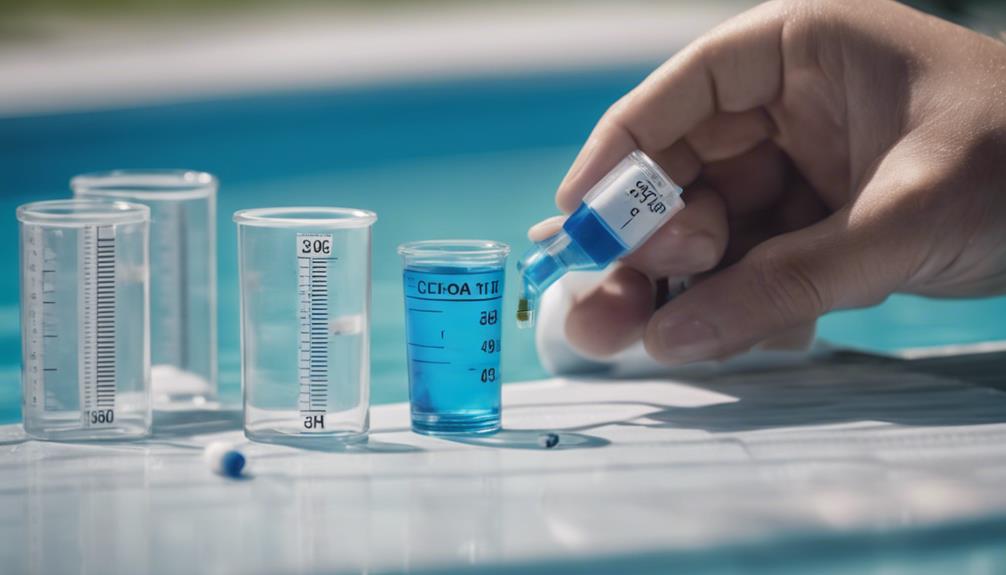
Monitoring the chlorine level in your pool is vital for maintaining water safety and cleanliness. The ideal chlorine level should fall within the range of 1-3 parts per million (ppm).
Insufficient chlorine levels can lead to algae growth and bacterial contamination, while excessive chlorine can cause skin and eye irritation. Regularly testing the chlorine levels using pool water test kits is important to maintaining a healthy swimming environment.
Adjusting the chlorine levels as needed will help prevent waterborne illnesses and guarantee that your pool remains a safe and enjoyable space for swimmers. By staying vigilant about monitoring and maintaining proper chlorine levels, you can promote crystal-clear water and a pristine pool environment all summer long.
Pool Shocking Process
To effectively maintain water clarity and eliminate impurities in your pool, the pool shocking process is an essential step in ensuring a clean and safe swimming environment. Shocking your pool involves adding a higher dose of chlorine to remove impurities, restore water clarity, eliminate algae, boost sanitizer effectiveness, and prevent cloudy water and health hazards. It is important to shock your pool regularly to maintain ideal water quality. Below is a table outlining the key benefits of the pool shocking process:
| Benefits of Pool Shocking | |
|---|---|
| Removes impurities | Restores water clarity |
| Eliminates algae | Boosts sanitizer |
| Prevents health hazards |
Pool Vacuuming and Brushing
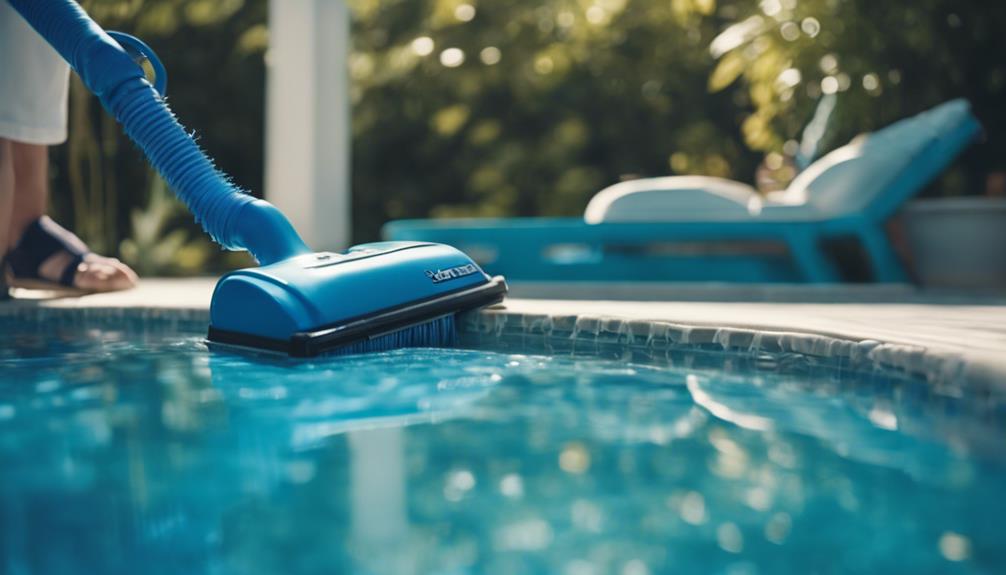
Efficient pool maintenance includes the essential tasks of vacuuming and brushing to maintain a clean and inviting swimming environment. To keep your pool pristine, follow these key steps:
- Remove Debris: Vacuum the pool bottom to eliminate dirt and debris.
- Eliminate Algae: Brush the pool walls to get rid of algae and bacteria.
- Regular Maintenance: Perform weekly vacuuming and brushing to upkeep cleanliness.
- Heavy Usage: For pools with heavy usage, consider more frequent cleaning sessions.
Importance of Circulation
Proper circulation in your pool is vital for preventing algae growth and maintaining water clarity. Sufficient water movement helps distribute chemicals evenly, preventing localized algae blooms. By running a water pump for 8-12 hours daily, you make sure that the water is constantly filtered and sanitized.
In addition, cleaning the skimmer basket weekly and regularly maintaining the filter are essential steps to maintain the best circulation. Properly angled jets also play a significant role in ensuring that water circulates effectively throughout the pool.
Neglecting circulation can result in stagnant areas where algae thrive and bacteria accumulate. Thus, prioritizing circulation in your pool maintenance routine is crucial to enjoying a clean and pristine swimming environment throughout the summer.
Chemistry and Cleaning Essentials
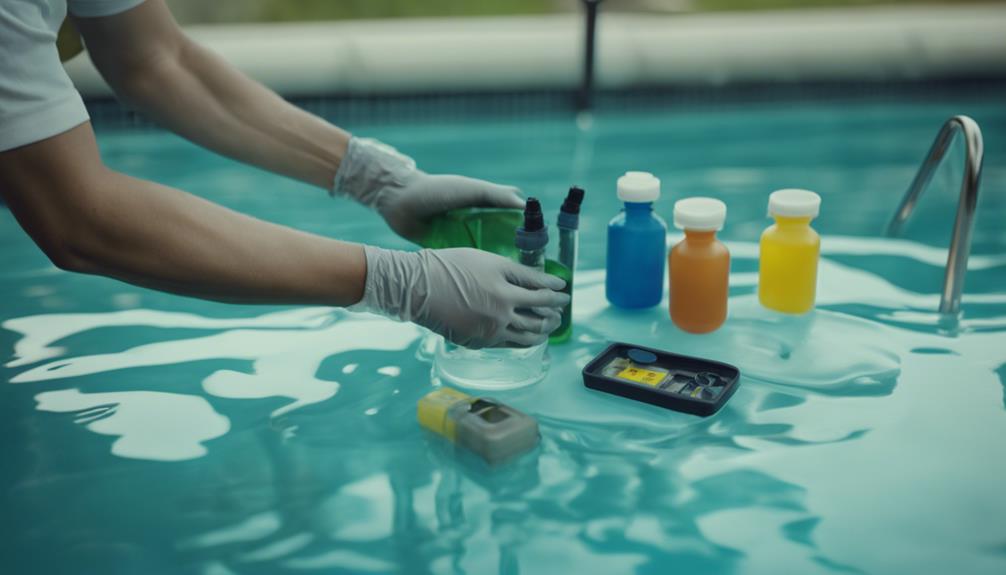
Maintaining the chemical equilibrium and cleanliness of your pool is essential for a safe and enjoyable swimming experience throughout the summer season. To optimize your pool stays pristine, follow these key steps:
- Balance Chemical Levels
- Maintain pH between 7.2 and 7.8
- Keep chlorine levels between 1-3 ppm
- Monitor calcium hardness (200-400 ppm) and alkalinity (120-150 ppm)
- Adjust chemicals as needed for best water balance
- Regular Cleaning Routine
- Skim pool surface for debris
- Scrub pool walls and bottom to prevent algae
- Vacuum weekly for a spotless pool
- Use pool robots for efficient cleaning
- Shock the Pool
- Eliminate impurities with a shock treatment
- Improve water clarity and sanitizer effectiveness
- Prevent algae growth and health hazards
- Maintain a clean and inviting swimming environment
- Expert Consultation
- For professional pool care, contact Shoreline Pools at (203) 357-1544
Frequently Asked Questions
Can I Use Tap Water to Fill My Pool?
Yes, you can use tap water to fill your pool. However, make sure it meets water quality standards. Testing for pH levels, chlorine content, and hardness is recommended. Consider using a water softener if tap water is hard to prevent scaling issues.
How Often Should I Replace My Pool Filter?
Regularly replace your pool filter every 1-2 years to maintain peak filtration efficiency. A clean filter guarantees crystal-clear water and prevents equipment damage. Stay ahead of clogs and contaminants by adhering to a consistent replacement schedule.
Should I Shock the Pool After Heavy Rainfall?
After heavy rainfall, it is advisable to shock the pool to remove impurities, restore water clarity, and prevent algae growth. Regularly shocking the pool helps maintain a clean and safe swimming environment, ensuring best water quality.
Can I Use Regular Household Bleach Instead of Chlorine?
Using regular household bleach as a substitute for pool chlorine is not recommended. Household bleach may contain additional chemicals that can harm pool equipment and affect water chemistry. Stick to using pool-specific chlorine products for safe and effective pool maintenance.
How Do I Prevent Calcium Buildup in My Pool?
'Preventing calcium buildup in pools is essential for best performance. Regularly test and adjust water chemistry to maintain proper calcium hardness levels between 200-400 ppm. Consult pool professionals for expert advice on managing calcium buildup effectively.'
Conclusion
To sum up, maintaining proper pool water chemistry is essential for a safe and enjoyable swimming experience.
According to the Centers for Disease Control and Prevention, nearly 80% of public pool inspections reveal at least one violation of safety standards, underscoring the significance of regular testing and maintenance.
By following a structured maintenance routine and staying vigilant with water testing and treatment, pool owners can secure a clean and healthy environment for swimmers.

